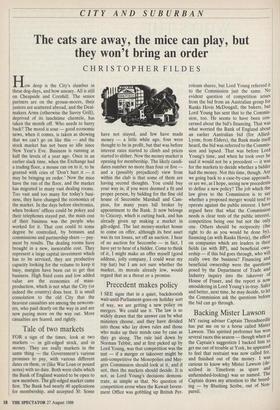CITY AND SUBURBAN
The cats are away, the mice can play, but they won't bring an order
CHRISTOPHER FILDES
How deep is the City's slumber in these dog-days, and how uneasy. All is still on Cheapside and Cornhill. The senior partners are on the grouse-moors, their juniors are scattered abroad, and the Deal- makers Arms (otherwise the Savoy Grill), deprived of its lunchtime clientele, has taken the month off. Who needs to hurry back? The mood is sour — good economic news, when it comes, is taken as showing that we can't go on like this — and the stock market has not been so idle since New Year's Eve. Business is running at half the levels of a year ago. Once in an earlier slack time, when the Exchange had a trading floor, a mouse ran on to it, to be greeted with cries of 'Don't hurt it — it may be bringing an order.' Now the mice have the run of the floor, and the market has migrated to many vast dealing rooms. Too vast and too many for today's busi- ness, they have changed the economics of the market. In the days before electronics, when brokers' offices could be pokey and their telephones stayed put, the main cost of their business was the people who worked for it. That cost could to some degree be controlled, by bonuses and commissions and partnership share — pay- ment by results. The dealing rooms have brought in a new, inexorable cost. They represent a large capital investment which has to be serviced, they are productive capacity looking for the volume to keep it busy, margins have been cut to get that business. High fixed costs and low added value are the economics of mass- production, which is not what the City (or indeed the country) does best. It is small consolation to the old City that the heaviest casualties are among the newcom- ers, who paid dearly on the way in and are now paying more on the way out. More casualties are feared, and rightly.














































 Previous page
Previous page